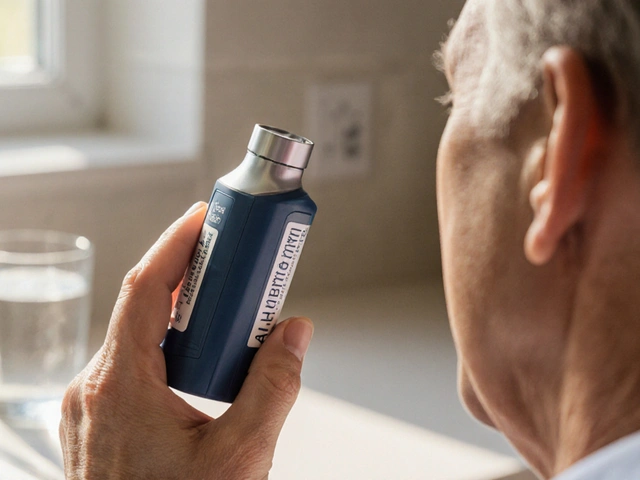It’s one thing to hear a doctor rattle off the name of a medication; it’s another to realize that millions—yes, millions—of families are starting and stopping that same drug every year, often without ever really understanding what’s happening inside their bodies. That medication is Singulair (or montelukast if you’re a stickler for generics), and whether you’re a parent like me or just someone tired of sniffling all spring, you’ll want more than a rushed office explanation. There’s a lot to unpack—some of it reassuring, some of it pretty surprising.
What Exactly Is Singulair and How Does It Work?
Singulair isn’t some brand-new potion with a mysterious origin story. It’s actually been around since the late 1990s, and its track record is impossible to ignore: kids and adults worldwide take it daily to stave off asthma attacks and allergy symptoms. The real secret sauce behind Singulair is how it blocks leukotrienes, which are pesky chemicals in your body that show up when pollen, pet dander, or dust tries to storm your immune system’s castle. Leukotrienes cause swelling in your airways and make the lining of your nose and lungs super sensitive. So when Singulair hops into the scene, it latches onto the leukotriene receptors—think of it as blocking the lock before the burglar (in this case, inflammation) can turn the key.
Doctors often reach for Singulair when inhalers alone aren’t cutting it, or if allergies are stubborn and wrecking sleep or school. For Rowan, my kid, nighttime coughing was relentless before he tried Singulair—the kind that keeps the whole house up. Pediatricians lean into this drug for exactly that: it’s approved for children as young as 6 months, though most kids are older before they get a script. It comes in different flavors (literally—chewables for little kids, tablets for big ones, and even granules for toddlers who refuse to swallow anything that isn’t a grape).
If you want numbers, how about this: according to 2024 CDC prescription data, around 20 million Americans filled a prescription for montelukast in the past year. The thing that really makes Singulair popular is that it isn’t a steroid, so some parents prefer it. And it’s taken once a day, which cuts down on the drama of remembering multiple doses or dealing with midday nurse visits at school.
But Singulair isn’t a rescue inhaler. It doesn’t stop an asthma attack or a sudden bout of sneezing on the spot. Think of it more as a bodyguard: it quietly does its job every day to reduce the chance of those moments ever happening, but it won’t step in mid-crisis. For the right person, it’s a game-changer for both asthma and allergies—sometimes both at the same time.
How Singulair Changed the Asthma and Allergy Game
You don’t see many oral medications with a track record like Singulair’s. When it hit the market, families desperate for options poured out grateful stories about finally sleeping through the night, fewer ER runs, and even fewer missed school days. Doctors loved that it was easy to prescribe with clear dosing by age, and as new research came out, many specialists recommended *adding* Singulair to existing inhaler routines rather than swapping one for the other. The goal? Layer up that protection, especially during allergy peaks or cold season.
Singulair really shook up how we treated kids with what’s called "allergic asthma"—when allergies and asthma feed off each other in a nasty loop. Allergy shots (immunotherapy) take time to work, inhaled steroids can bring growth worries in little ones, antihistamines make some kids drowsy or twitchy, and nasal sprays can be a hard sell for squirming toddlers. Montelukast became the go-to bridge for that in-between group: not quite sick enough for heavy-duty drugs, but too miserable to just tough it out.
There’s more to Singulair’s utility than just wheezing or sneezing. A couple of cool facts you may not know: in some clinical trials, it even reduced the number of upper respiratory infections kids got in the winter, and some adults saw better control of exercise-induced asthma. European allergy clinics have recommended it for pollen and mold seasons, and it’s a big favorite in schools with lots of kids who have sports-triggered asthma. For parents juggling inhalers, allergy meds, schedules, and after-school chaos, anything that simplifies the routine feels like magic.
But here’s where it gets tricky: over the last few years, newer treatments have joined the fray, like biologic injections for severe asthma and sublingual tablets for certain allergies. When I asked my pediatrician why she still prescribes Singulair, she said that the oral, once-daily option just fits into real life better for a lot of families, especially those dealing with pills, powders, or who can’t stick to a shot schedule. For many, it’s still the first step. Of course, keeping things simple doesn’t mean skipping out on safety conversations. And safety is where Singulair’s story takes a sharp turn.

Singulair’s Dark Side: Side Effects and Safety Debates in 2025
So many meds have their horror stories, but Singulair’s reputation took a real hit after mental health warnings became linked to its name. Moms in Facebook groups, Reddit threads, even waiting rooms have swapped stories of mood swings, sleepless nights, scary dreams, irritability, and even suicidal thoughts. In 2020, the FDA put a black box warning—their strictest—on all montelukast prescriptions, and honestly, a lot of pediatricians started getting cold feet. It wasn’t just kids, either: adults, especially those with a history of depression or anxiety, experienced symptoms they’d never had before or saw old ones come roaring back.
If you scan the latest studies, the risk of these neuropsychiatric side effects is real but uncommon—maybe about 1 in every 1,000 kids or adults. But data from the National Institutes of Health suggests that the numbers might be underreported, since mental health stuff can be tough to track. What’s really wild? For most people, the symptoms disappear within days of stopping the medication. But for a few, especially if they kept taking it for months or years, those feelings can linger and need professional help.
Parents like me face a wrenching decision. Rowan tried Singulair for eight weeks one fall, and while his chest stopped rattling at night, after about a month, he turned from his usual excited, chatty self into a moody, angry kid I barely recognized. I read the pharmacy sheet three times before even noticing the "may cause changes in mood or behavior" in tiny print. Our pediatrician didn’t brush off my concerns—she walked us through an immediate dose stop and said, “Always call if you notice sudden mood changes.” After five days off, Rowan was himself again.
Recent guidelines from allergy and pulmonology societies now tell doctors to lay out these risks up-front, not as fine print, and to screen for any family history of mental health struggles. The FDA’s 2020 black box warning also pushed for Singulair to be reserved for patients who can’t get the same relief from other allergy or asthma meds. Pharmacists are required to give a Medication Guide every time the script is filled. Here’s real talk: don’t skip the safety chat because you trust your doctor or because you’re desperate for a fix—ask about the mental health stuff, no matter how rare.
Here’s a quick look at the range of possible side effects, pulled from actual patient information leaflets and recent reviews:
| Common Side Effects | Rare/Serious Side Effects |
|---|---|
| Headache | Mood swings, depression |
| Stomach pain | Suicidal thoughts |
| Fatigue | Hallucinations, nightmares |
| Cough | Allergic reactions (skin rash, swelling) |
| Fever | Tic/compulsive behaviors |
There’s also a weird but true one called Churg-Strauss syndrome that involves blood vessel inflammation, but it’s super rare and usually happens in adults coming off steroids while starting Singulair. Don’t panic—but do take the warnings seriously.
Practical Tips for Families and Patients Using Singulair Today
If you’re considering Singulair, already taking it, or helping someone manage allergy or asthma chaos, a little preparation helps a lot. Here’s what’s worked in my household, plus what I’ve crowd-sourced from real parents, patients, and those allergy doc Q&As.
- Track symptoms and mood: Don’t just watch for better breathing or less sneezing. Keep a quick journal or notes app log about mood, sleep, and weird behaviors before and after starting the med. If everything goes smoothly for the first couple weeks, that’s a great sign, but don’t drop your guard just yet.
- Set a regular schedule:
- Singulair works best at the same time each day, so link it with something you always do (breakfast for adults, toothbrushing for kids).
- Ask about alternatives before starting:
- Some people can try inhaled steroids, antihistamines, nasal sprays, or newer drugs before Singulair—especially if mental health runs in your family.
- Don’t panic at the first sniffle:
- If you miss a dose, just take the next one at your usual time; don’t double up.
- Record the batch number:
- In rare cases, side effects have been linked to specific lots. Snapping a photo of the packaging can help track this if a recall pops up.
- Give updates to the doctor, even if nothing seems dramatic:
- Sometimes gradual changes are easier for a parent or friend to spot than for the patient.
- Get a Medication Guide every refill:
- This isn’t just paperwork—the FDA requires it for a reason.
Most insurance plans still cover generic montelukast because it’s cheap and effective, and if you need help with out-of-pocket costs, ask your pharmacy about coupons. Brand-name Singulair is usually much pricier unless you have unusually strict coverage. For little kids, the chewable tablets are lifesavers, but they aren’t candy, so keep them out of reach.
For athletes using Singulair for exercise-induced symptoms, it’s usually taken two hours before sports (not after). For allergy folks, you’ll see better results if you combine Singulair with trigger avoidance—so yes, keep those windows shut during pollen season and invest in a good HEPA filter for the bedroom.
Never stop Singulair cold turkey without talking to a doctor, especially if you’re on other asthma medicines. Sometimes stopping the drug suddenly in people who rely on it for severe asthma can bring on a flare, so have an action plan in place. If the reason you’re stopping is mental health symptoms, let your care team know—they might want to switch you to something else right away or set up more support.
If you travel, pack a few extra doses—unexpected trips, delays, and schedule changes can happen. And if you ever notice a new or weird symptom, trust your gut. Breathe a little easier—and stay informed.






Edward Hyde
Singulair? More like Singu-lie. They sold this shit like it was a miracle cure while quietly burying the fact that it turns kids into zombie rage machines. My cousin’s 8-year-old started screaming at the mirror and trying to climb the walls after two weeks. Doctor said 'it’s just phase.' Phase my ass. This drug is a chemical lobotomy with a side of asthma relief.
Charlotte Collins
The FDA’s black box warning is not a suggestion. It’s a siren. The fact that pediatricians still prescribe this as a first-line option without mandatory mental health screening is negligent. The data is out there-underreported, yes, but still statistically significant. The cost-benefit analysis is skewed toward convenience, not safety. Families deserve better than being handed a pill and told to 'watch for changes' while the system shrugs.
Margaret Stearns
I gave singulair to my daughter for 3 weeks. She got less coughing but started sleepwalking. We stopped it. She stopped sleepwalking. No big deal. Just listen to your kid. If something feels off, stop. You don't need a PhD to know when something's wrong.
amit kuamr
In india we dont use this much. Too expensive and too many side effects. We use nebulizer and steam. Simple. Cheap. Works. Why make kids take pills that make them crazy when air and water can fix it?
Scotia Corley
It is imperative to acknowledge that the pharmacological profile of montelukast, while efficacious in modulating leukotriene-mediated inflammatory pathways, carries a nontrivial neuropsychiatric risk profile. The prevalence of adverse events, though low, is not negligible in the context of pediatric populations with developing neurobiology. Clinical guidelines must be adhered to with precision.
elizabeth muzichuk
They knew. They knew this drug caused psychosis and they let it stay on the market for 25 years. Big Pharma doesn’t care about your child. They care about profit. The black box warning? A PR move. The real scandal? The fact that thousands of families were told to 'just monitor' while their kids spiraled. This isn’t medicine. It’s corporate manslaughter.
Debbie Naquin
Montelukast operates as a CysLT1 receptor antagonist, thereby inhibiting the downstream proinflammatory cascade initiated by leukotriene D4. The neurobehavioral sequelae, while statistically infrequent, represent a violation of homeostatic equilibrium in the CNS-particularly in the amygdala-prefrontal circuitry. The risk-benefit calculus shifts dramatically when alternative modalities exist. We are not merely treating asthma; we are intervening in neurochemical architecture.
Karandeep Singh
Singulair bad. Asthma bad. Pills bad. Just breathe clean air. Done.
Mary Ngo
Did you know the FDA’s black box warning was delayed for 7 years because Merck lobbied against it? And that the clinical trials excluded kids with anxiety disorders? That’s not oversight-that’s a cover-up. The same company that pushed Vioxx is now selling chemical sedatives to toddlers. Wake up. This isn’t medicine. It’s chemical control disguised as care.
James Allen
Look, I get it. Parents are desperate. But this isn’t a 'maybe' situation. If your kid gets moody, sleepless, or starts talking to imaginary friends after Singulair? STOP. No debate. No 'wait and see.' My brother’s kid had hallucinations. Took three months to recover. Don’t be the parent who says 'it was just a phase.' It wasn’t. It was a drug reaction. And you owe it to your kid to be the one who says 'no more.'
Kenny Leow
As someone from Singapore where asthma rates are rising fast, I’ve seen Singulair used a lot. But here’s the thing-we pair it with air purifiers, strict dust control, and nasal rinses. The pill isn’t the hero. The lifestyle is. Maybe we’re too quick to reach for the pill instead of fixing the environment. Just a thought. 🌿
Kelly Essenpreis
America needs more pills. More pills means more profits. More profits means more doctors who don't care. Singulair? Yeah it works. So does poison. Doesn't mean you should take it.
Alexander Williams
Leukotriene modulation is a valid therapeutic target, but the off-target CNS effects-particularly in developing brains-represent an unacceptable pharmacodynamic liability. The risk-benefit ratio is untenable when non-pharmacologic interventions and alternative pharmacotherapies (e.g., inhaled corticosteroids, biologics) are underutilized due to systemic inertia.
Suzanne Mollaneda Padin
My son was on Singulair for a year. We didn’t notice mood changes until he started having panic attacks before school. We stopped it. Within 10 days, he was laughing again. I wish we’d known earlier. If you’re considering it, track mood like you track breathing. And if you see a shift-stop. Don’t wait for the doctor to say something. You’re the expert on your child.
Erin Nemo
I gave my kid Singulair and he went from happy to angry in 2 weeks. We stopped. He was back in 4 days. Don't overthink it. If they act weird, stop the pill. Easy.
ariel nicholas
Who authorized this? Who signed off? The FDA? The AAP? The pharmaceutical industry? The same people who told us cigarettes were safe. We’re not just treating asthma-we’re normalizing chemical suppression of childhood. And we call this progress? We’re not curing disease. We’re medicating behavior. And we’re doing it while parents are too exhausted to question it.
Rachel Stanton
For families navigating asthma and allergies, Singulair can be a lifeline-but only if used with eyes wide open. I always recommend starting low, tracking mood and sleep with a simple daily log (even just a sticky note), and having a clear exit plan with your provider. The goal isn’t just symptom control-it’s preserving your child’s emotional well-being. You’re not being paranoid if you notice a change. You’re being a good parent.
Edward Hyde
Oh so now you’re the mom who ‘just stopped it’? Congrats. You got lucky. My neighbor’s kid had suicidal ideation. Took six months of therapy. And the doctor? Said ‘maybe it was puberty.’ No. It was the damn pill. You think you’re being responsible? You’re just one of the ones who didn’t get hit yet. Wait till it’s your kid screaming in the dark.